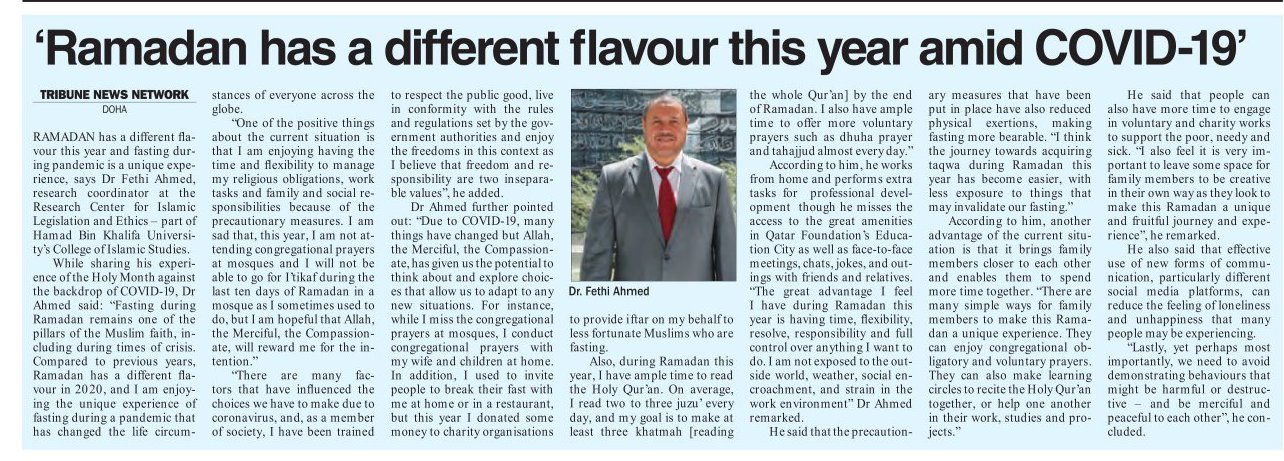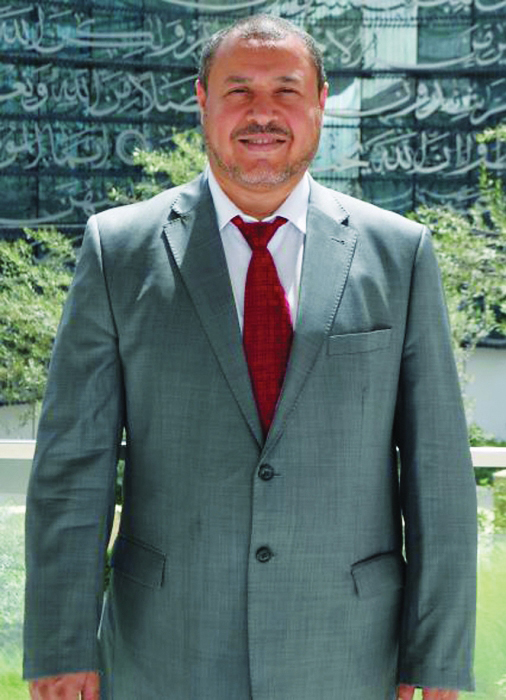
TRIBUNE NEWS NETWORK DOHA
RAMADAN has a different flavour this year and fasting during pandemic is a unique experience, says Dr Fethi Ahmed, research coordinator at the Research Center for Islamic Legislation and Ethics – part of Hamad Bin Khalifa University’s College of Islamic Studies.
While sharing his experience of the Holy Month against the backdrop of COVID-19, Dr Ahmed said: “Fasting during Ramadan remains one of the pillars of the Muslim faith, including during times of crisis. Compared to previous years, Ramadan has a different flavour in 2020, and I am enjoying the unique experience of fasting during a pandemic that has changed the life circumstances of everyone across the globe.
“One of the positive things about the current situation is that I am enjoying having the time and flexibility to manage my religious obligations, work tasks and family and social responsibilities because of the precautionary measures. I am sad that, this year, I am not attending congregational prayers at mosques and I will not be able to go for I’tikaf during the last ten days of Ramadan in a mosque as I sometimes used to do, but I am hopeful that Allah, the Merciful, the Compassionate, will reward me for the intention.”
“There are many factors that have influenced the choices we have to make due to coronavirus, and, as a member of society, I have been trained to respect the public good, live in conformity with the rules and regulations set by the government authorities and enjoy the freedoms in this context as I believe that freedom and responsibility are two inseparable values”, he added.
Dr Ahmed further pointed out: “Due to COVID-19, many things have changed but Allah, the Merciful, the Compassionate, has given us the potential to think about and explore choices that allow us to adapt to any new situations. For instance, while I miss the congregational prayers at mosques, I conduct congregational prayers with my wife and children at home. In addition, I used to invite people to break their fast with me at home or in a restaurant, but this year I donated some money to charity organisations to provide iftar on my behalf to less fortunate Muslims who are fasting.
Also, during Ramadan this year, I have ample time to read the Holy Qur’an. On average, I read two to three juzu’ every day, and my goal is to make at least three khatmah [reading the whole Qur’an] by the end of Ramadan. I also have ample time to offer more voluntary prayers such as dhuha prayer and tahajjud almost every day.”
According to him, he works from home and performs extra tasks for professional development though he misses the access to the great amenities in Qatar Foundation’s Education City as well as face-to-face meetings, chats, jokes, and outings with friends and relatives. “The great advantage I feel I have during Ramadan this year is having time, flexibility, resolve, responsibility and full control over anything I want to do. I am not exposed to the outside world, weather, social encroachment, and strain in the work environment” Dr Ahmed remarked.
He said that the precautionary measures that have been put in place have also reduced physical exertions, making fasting more bearable. “I think the journey towards acquiring taqwa during Ramadan this year has become easier, with less exposure to things that may invalidate our fasting.”
According to him, another advantage of the current situation is that it brings family members closer to each other and enables them to spend more time together.
“There are many simple ways for family members to make this Ramadan a unique experience. They can enjoy congregational obligatory and voluntary prayers. They can also make learning circles to recite the Holy Qur’an together, or help one another in their work, studies and projects.”
He said that people can also have more time to engage in voluntary and charity works to support the poor, needy and sick. “I also feel it is very important to leave some space for family members to be creative in their own way as they look to make this Ramadan a unique and fruitful journey and experience”, he remarked.
He also said that effective use of new forms of communication, particularly different social media platforms, can reduce the feeling of loneliness and unhappiness that many people may be experiencing.
“Lastly, yet perhaps most importantly, we need to avoid demonstrating behaviours that might be harmful or destructive – and be merciful and peaceful to each other”, he concluded.


Dr Fethi B Jomaa Ahmed
Source: Qatar Tribune














Add new comment